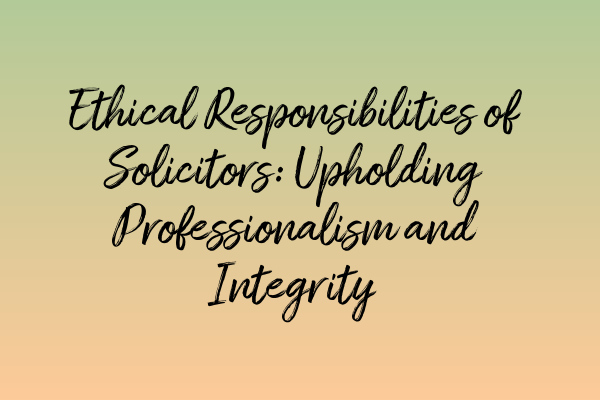Ethical Responsibilities of Solicitors: Upholding Professionalism and Integrity
As professionals in the legal field, solicitors carry a significant responsibility to uphold the highest standards of professionalism and integrity. Ethical considerations are at the core of a solicitor’s practice, guiding their actions and ensuring the protection of their clients’ interests. In this article, we will explore the ethical responsibilities of solicitors and the importance of maintaining professionalism and integrity in the legal profession.
What are Ethical Responsibilities?
Ethical responsibilities refer to the set of guidelines and principles that govern the behavior and actions of solicitors. These responsibilities are grounded in the Solicitors Regulation Authority (SRA) Code of Conduct, which serves as the benchmark for professional behavior in the legal industry.
By adhering to ethical responsibilities, solicitors demonstrate their commitment to acting in the best interests of their clients, maintaining the public’s trust, and upholding the reputation of the legal profession. It is essential for solicitors to familiarize themselves with these responsibilities and integrate them into their daily practice.
Professionalism and Integrity
Professionalism and integrity are integral components of a solicitor’s ethical responsibilities. They are the foundations upon which trust is built and maintained between solicitors, clients, and the wider public. Let’s delve deeper into these essential aspects.
Professionalism
Professionalism goes beyond mere technical competence. It includes qualities such as diligence, honesty, and respect towards clients, colleagues, and the court. A professional solicitor works diligently to provide effective legal services, paying attention to detail, and staying updated with the latest developments in the law.
Furthermore, a professional solicitor is mindful of their role as an advocate for their clients. They strive to understand their clients’ needs, provide clear and comprehensive advice, and represent their interests to the best of their ability. Professionalism also extends to maintaining appropriate communication, ensuring confidentiality, and acting with integrity at all times.
To learn more about the importance of professionalism in the realm of property law, you may be interested in reading our article on Solicitors Property Law: Key Principles and Practical Applications.
Integrity
Integrity is a fundamental aspect of the solicitor-client relationship. It involves being honest, trustworthy, and acting with high moral principles. A solicitor must always act in the best interests of their clients and avoid any conflict of interest that may compromise their professional judgment.
Integrity also extends to solicitors’ financial dealings and trust account management. Maintaining accurate records, avoiding commingling of funds, and promptly delivering client funds are essential in upholding the trust clients place in their solicitors. By demonstrating integrity, a solicitor establishes a reputation for reliability and ethical conduct.
If you are interested in real-world scenarios that explore the interplay between property law and ethical considerations, our article on SQE Case Studies in Property Law: Real-World Scenarios for Examination Success can provide valuable insights.
Client Confidentiality and Trust
Client confidentiality and trust are integral aspects of a solicitor’s ethical responsibilities. Solicitors are obligated to maintain strict client confidentiality, safeguarding the information shared by clients in the course of their legal representation. This responsibility extends even beyond the termination of the solicitor-client relationship.
By maintaining client confidentiality, solicitors foster an environment where clients can openly and honestly communicate their concerns, ensuring the provision of effective legal advice. This trust is essential in establishing a strong solicitor-client relationship, which is built on mutual respect and confidence.
Additionally, solicitors must avoid any action that may compromise their clients’ interests or case. This includes refraining from sharing privileged information and ensuring that conflicts of interest are identified and resolved appropriately.
Continued Professional Development
Continued professional development (CPD) is a cornerstone of a solicitor’s ethical responsibilities. Solicitors are expected to stay updated with changes and advancements in the law to ensure their advice remains accurate and relevant.
Engaging in regular training programs and educational opportunities enables solicitors to enhance their skills, expand their knowledge base, and continuously improve their professional practice. By participating in CPD, solicitors can keep abreast of legal developments, new legislation, and emerging ethics issues relevant to their area of practice.
If you are interested in deepening your knowledge of lease extensions and enfranchisement, a complex area of property law, we recommend reading our article on Lease Extensions and Enfranchisement: Navigating Complex Legal Procedures.
The Impact of Ethical Responsibilities on the Legal Profession
The ethical responsibilities of solicitors play a crucial role in safeguarding the reputation and integrity of the legal profession. By upholding professionalism, integrity, client confidentiality, and engaging in continuous professional development, solicitors contribute to the delivery of justice and maintain public trust.
Furthermore, adhering to ethical responsibilities fosters a fair and balanced legal system, where clients can rely on their solicitors to provide sound advice, act in their best interests, and uphold the highest standards of ethical conduct.
Conclusion
Ethical responsibilities form the cornerstone of a solicitor’s practice, guiding their behavior and actions towards maintaining professionalism, integrity, and client trust. Upholding these responsibilities ensures that solicitors act in the best interests of their clients, maintain the trust of the wider public, and enhance the reputation of the legal profession. By adhering to ethical guidelines, solicitors contribute to the delivery of justice and the promotion of a fair and transparent legal system.
If you would like to learn more about the interplay between mortgages, land law, and ethical considerations, our article on Mortgages and Land Law: Exploring the Interplay between Property and Finance provides valuable insights.
Lastly, for a comprehensive understanding of landlord responsibilities in the UK and the legal obligations associated with this role, we recommend reading our article on Demystifying Landlord Responsibilities in the UK: Legal Obligations Explained.


Leave a Reply